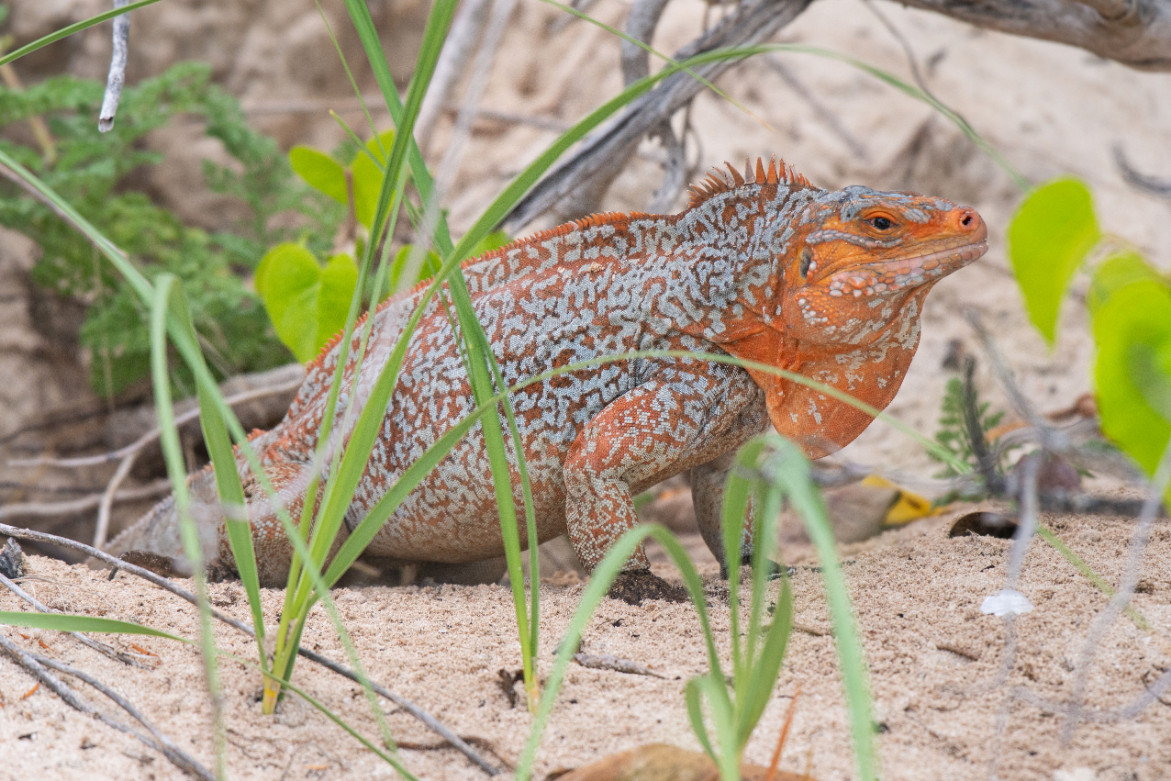Uniting for Iguana Conservation: Charting the Future of the Central Bahamian Rock Iguana

By: Elijah Sands
The Bahamas National Trust (BNT), is spearheading an important collaborative initiative to conserve one of The Bahamas’ most distinctive yet endangered species – the Central Bahamian Rock Iguana (Cyclura rileyi).
The Central Bahamian Rock Iguana, an endemic species with a storied history, is only found on a few cays in The Central Bahamas. Known for their distinctive spiny crests and striking, colourful appearance, these iguanas are not just a keystone species but also a symbol of The Bahamas’ rich and unique biodiversity. They play a crucial role in natural ecosystems, from seed dispersion to maintaining the health of our native flora.
Sadly, the Central Bahamian Rock Iguana’s existence is threatened by habitat loss, invasive species, and human interference. These pressures have led to dwindling populations, with uncertain estimates leaving conservationists concerned about their future. It is estimated that its current area of distribution represents only 0.2% of its former range. A substantial portion of the iguana population exists within the national parks of San Salvador, and the Moriah Harbour Cay National Park, managed by the BNT. These parks are critical strongholds for the iguana’s survival and will play a crucial role in the species’ conservation and recovery.
To answer the call, in partnership with Re:wild, and Fauna & Flora, and through funding provided by the Critical Ecosystem Partnership Fund, the BNT convened the San Salvador Rock Iguana Conservation Action Plan Workshop. This multi-agency workshop had a clear goal: develop a robust 5-year Conservation Action Plan for the conservation of the species. The workshop brought together 26 professionals from 11 agencies for two days of planning, collaboration and collective action.
During the workshop, participants received presentations from experts in Iguana research, tourism professionals, and local conservation professionals, discussed past, present and potential future threats to the iguana and outlined strategic initiatives and opportunities to advance the conservation and recovery of the critical species.
The workshop, which was structured into interactive sessions, focused on various aspects of iguana conservation, including habitat protection, biosecurity, population monitoring, capacity building, responsible tourism, and community engagement. Participants also created a unified 20-year vision statement that encapsulates the shared goal of ensuring the iguana’s survival and prosperity.
In preparation for the workshop, Senior Science Officer Giselle Deane travelled with Re:wild partners Dr. Jenny Daltry and Justin Springer to San Salvador to observe iguanas in the national parks and speak with locals about the iguanas, their environment and how they are perceived by residents.
The resulting conservation action plan will guide future steps to ensure the continued existence of this unique species and include tangible objectives and activities such as strengthening protected area management, encouraging responsible tourism, enhancing law enforcement, and launching educational and awareness campaigns to elevate the iguana’s profile among Bahamians and visitors alike.
This highly collaborative endeavour is more than a plan for species survival – it could be a blueprint for action plans for the many other at-risk species in The Bahamas. A second, similar workshop is planned for next year and will focus on the endangered endemic bird, the Bahama Oriole. This workshop reflected our collective dedication to environmental stewardship and desire to conserve our natural world.
“The Bahamas National Trust is deeply committed to the conservation of the Central Bahamian Rock Iguana. said Falon Cartwright, BNT Director of Science and Policy. “By effectively managing national parks and supporting scientific research, we are supporting the conservation and recovery of this iconic species. As we stand at the cusp of transformative conservation action, we are determined to ensure that future generations inherit a Bahamas where these majestic creatures are not just surviving but flourishing. National parks are the sanctuaries where we can turn this vision into reality, showcasing these symbols of natural beauty and biodiversity.”
“It was a pleasure facilitating this workshop, which lays the foundation for the development of The Central Bahamian Rock Iguana Conservation Action Plan. This experience highlights that while this species faces many threats, there are persons committed to its long-term conservation,” said Justin Springer from Re:wild.
“I am very honoured to facilitate the recovery action plan for this incredibly charming but critically endangered iguana”, said Dr. Jenny Daltry, Caribbean Alliance Director for Re:wild and Fauna & Flora. “Caribbean wildlife are under such enormous pressures that this region has the world’s highest extinction rates. But I believe the Central Bahamian Rock Iguana has a real hope of survival thanks to the obvious pride, expertise and determination I saw among the workshop participants and local residents.”
The BNT invites everyone to stay tuned for updates as we complete the Action Plan and learn how you can contribute to a future where the Central Bahamian Rock Iguana thrives once again.
The BNT sends a special thank you to Dr Jenny Daltry from Re:wild and Fauna & Flora, Justin Springer from Re:wild and Giselle Deane, BNT Senior Science Officer for facilitating. Additionally, we send our gratitude to everyone who participated in the workshop and contributed their interest, and expertise to advance the conservation of this species:

Virtual Participants: Dr. William Hayes (LLU), Dr. Graham R. Reynolds (UNCA), Dr. Troy Dexter (GRC), Eboné Blyden (DEPP)
The development of this action plan and the workshop was supported by Re:wild, Fauna & Flora and the Critical Ecosystem Partnership Fund under the project “Call to Action: Action Planning for Endangered Caribbean Species” (2023-2026), which aims to create enabling conditions for the recovery of priority threatened species in Antigua & Barbuda, The Bahamas, Jamaica, Saint Lucia, and St. Vincent & the Grenadines.
See all photos from the 2023 Central Iguana Conservation Action Plan Workshop









